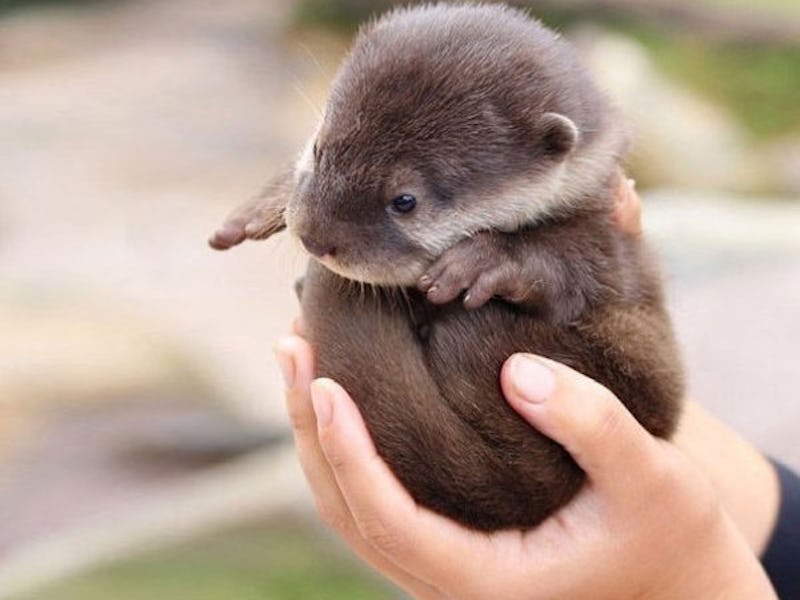Wildlife Experts Weigh in on Japan's Obsession With Smuggled Pet Otters
They make bad pets, anyway.

Look, we all know otters are cute as heck, with their big eyes and sharp little teeth. But just because an animal is cute does not mean you should bring it home with you. Unfortunately, this fact appears to be lost on a group of people fueling a thriving international market of illegal otter smuggling in Asia — a market that seems to overwhelmingly feed on demand from Japanese customers.
According to a report published in June by TRAFFIC, a non-governmental organization that monitors the wildlife trade, the pet trade poses the most significant threat to otter populations, especially in Indonesia and Thailand. But the otter trade doesn’t just mean people catch otters in their backyards and sell them at the local market — though they do that too. Captive otters are often traded internationally, and significant numbers of illegally traded otters end up in Japan, where they become home pets or populate otter cafes. Out of 59 otters seized by authorities from 2015 to 2017, 35 were seized in Thailand, 32 of which were on their way to Japan.
And while smuggling otters into Japan is illegal, the Japan Times reports that once the otters are in the country, people can buy and sell them freely.
To get a better idea of the nature of the otter market, the report’s authors examined numbers from official seizures in smuggling cases, as well as from online data that included blatant advertising on Facebook.
“The primary threat to otters in Southeast Asia from the illegal wildlife trade would appear to be exploitation for the pet industry, evident through the seizure and online data analysis which revealed the relatively high demand for live otters, a large proportion of which were juveniles,” write the report’s authors, Lalita Gomez, program manager for TRAFFIC Southeast Asia, and consultant Jamie Bouhuys.
The hairy-nosed otter is endangered, meaning it's illegal to trade it, except in very rare circumstances.
Four species of otter are native to Southeast Asia: the Eurasian otter (Lutra lutra), the hairy-nosed otter (L. sumatrana), the small-clawed otter (Aonyx cinereus), and the smooth-coated otter (Lutrogale perspicillata). The authors report that population numbers for the otters aren’t well-recorded, but they’re generally declining, due in no small part to population loss as a result of human activity — fishing, farming, hunting, et cetera. The pet trade only serves to worsen this ecological situation as otters are removed from the wild and sent abroad to live as pets.
The International Union for Conservation of Nature’s Red List designates the Eurasian otter as near threatened, the hairy-nosed otter as endangered, and the small-clawed otter and smooth-coated otter as vulnerable. These four otter species are also listed in the two most restrictive categories of the Convention on International Trade in Endangered Species of Wild Fauna and Flora (CITES), Appendix I and Appendix II, meaning pet trade is not permitted under the international agreement.
In addition to the ecological cost of capturing wild otters as pets, people who own pet otters may face unexpected hardships.
If you must have a pet otter, why not a cruelty-free one?
“Many of these pets, upon reaching maturity, become an enormous expense for the family that possess it due to the large quantity of food that the otter requires,” wrote Juan Ricardo Gómez Serrano in a 2003 bulletin for the IUCN Otter Specialist Group. “Likewise, many otters are killed by humans due to a fear of their considerable size and strength.” While Gómez Serrano’s report was on otters in Colombia, the IUCN’s Otter Specialist Group echoes TRAFFIC’s findings that Japan is a common destination for smuggled otters.
As Inverse previously reported, some researchers blame social media, at least in part, for the rising popularity of exotic pets. The TRAFFIC report shows that not only does social media encourage the illegal otter trade with cute pictures and videos of pet otters, but the illegal otter trade literally takes place on social media.
“In February 2018, at least 14 groups were observed specifically dedicated to the keeping of otters with a combined number of 19,514 members,” write the report’s authors. “While few otters were observed for sale during the market surveys, traders expressed a willingness to acquire otters for the right price.”
So, yes, you can get an otter as a pet, but you really, really shouldn’t.